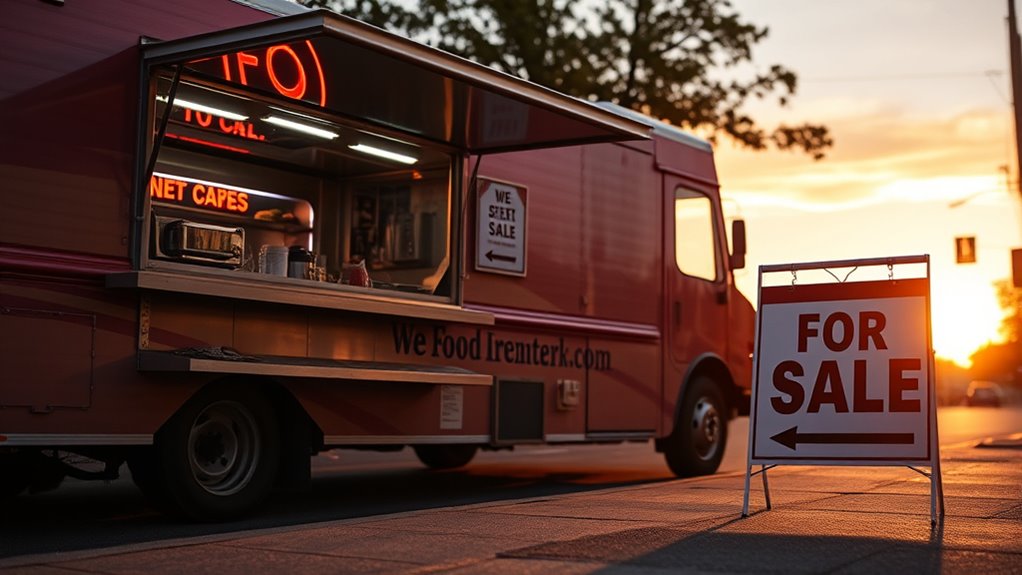To successfully close or sell your food truck business, start by evaluating your fleet’s condition, maintenance history, and remaining lifespan to determine its value. Gather all legal, financial, and operational documentation to guarantee transparency. Review your licenses and permits, and transfer or cancel them as needed. Communicate clearly with your team, suppliers, and customers about the changeover. Following best practices in legal and fleet management will help you maximize value and streamline the process—more details ahead can guide you through each step.
Key Takeaways
- Conduct a thorough fleet assessment to determine asset value and decide whether to sell trucks individually or as a package.
- Review and transfer or cancel licenses, permits, and health certifications according to jurisdiction requirements.
- Gather all business documentation, including financial records and operational licenses, to facilitate transparent transactions.
- Communicate clearly with team, suppliers, and customers about the closure or sale timeline and process.
- Ensure compliance with legal and licensing requirements, and organize documentation to streamline the closure or sale process.

Deciding to close or sell your food truck business can be a challenging and emotional process, but approaching it with a clear plan can make the shift smoother. One of your first steps should be evaluating your current operations, especially your fleet management. Your truck isn’t just a vehicle; it’s a critical part of your business’s identity and value. Making an inventory of your fleet’s condition, maintenance history, and remaining lifespan helps you determine its worth and whether it’s more advantageous to sell the truck outright or include it as part of a package deal. Proper fleet management also involves organizing all relevant documentation, such as maintenance logs, registration papers, and any upgrades or modifications made over time. This transparency reassures potential buyers and streamlines the sales process.
Evaluate your fleet’s condition and organize documentation to streamline selling or closing your food truck business.
Before you list your truck for sale or plan its closure, you need to address licensing requirements. This step is essential because food trucks operate under strict local, state, and federal regulations. You’ll want to review your current licenses, permits, and health department certifications to understand if they can be transferred, renewed, or if you need to start the process anew for the next owner. Some jurisdictions allow the transfer of certain licenses, but others require new applications, which could involve additional fees or inspections. Confirming all licensing requirements are satisfied not only prevents legal issues after the sale but also adds credibility to your business in the eyes of potential buyers. If you’re closing your business, cancel any active licenses and permits to avoid ongoing fees or penalties.
Additionally, if you plan to sell the truck along with your business’s assets, you’ll want to prepare all necessary documentation, including financial records, sales history, and operational licenses. This transparency helps build trust with prospective buyers and can facilitate a smoother transaction. For those closing the business entirely, consider the legal and financial implications, such as settling outstanding debts, notifying suppliers, and cancelling contracts. Handling these details diligently will prevent complications down the line.
Throughout this process, communicate clearly with your team, suppliers, and customers. If you’re selling, inform your team and ensure they’re aware of the transition timeline. For closures, providing notice and handling final transactions professionally maintains your reputation. Remember, whether selling or closing, approaching the situation with organization and compliance with licensing requirements will make the transition less stressful and more efficient. Being aware of fleet management best practices can also help you maximize the value of your assets during this transition. With a strategic plan rooted in proper fleet management and regulatory adherence, you’ll be better prepared for the next chapter, whatever it may hold.
Frequently Asked Questions
How Do I Determine the Fair Market Value of My Food Truck?
To determine your food truck’s fair market value, start with appraisal methods like adjusting for condition and age. Then, compare it to market comparables—similar trucks recently sold in your area. Consider factors like mileage, equipment, and location. You can also consult a professional appraiser for an expert opinion. Combining these approaches helps you arrive at an accurate price, whether you’re selling or just evaluating its worth.
What Legal Steps Are Required to Transfer Ownership?
To transfer ownership, you need to handle the lease transfer and prepare all necessary legal documentation. You’ll want to review your lease agreement and get the landlord’s approval for the lease transfer. Then, draft and sign legal documents like a bill of sale and an assignment agreement. Confirm all paperwork is properly executed and filed, and update any licensing or permits to reflect the new owner.
Are There Tax Implications When Selling My Food Truck?
When selling your food truck, you’ll face tax implications that can surprise you, like capital gains. You need to report the sale on your tax return, and if you sell for more than your basis, you’ll owe taxes on the profit. Ignoring tax reporting can lead to penalties. So, it’s essential to understand how capital gains influence your tax obligations and plan accordingly to avoid surprises.
How Can I Effectively Market My Food Truck for Sale?
To effectively market your food truck for sale, leverage social media platforms like Facebook, Instagram, and LinkedIn to reach local and industry audiences. Post high-quality photos, detailed descriptions, and contact info regularly. Additionally, list your truck on online marketplaces such as Craigslist or specialized business-for-sale websites. Engage with interested buyers promptly, and consider offering virtual tours to showcase your truck’s features, increasing your chances of a quick sale.
What Are Common Challenges Faced When Closing a Food Truck Business?
You face challenges like managing financial considerations, ensuring you settle debts, and handling taxes properly. Customer retention becomes tough as you notify loyal clients about your closure, risking a loss of goodwill. You also need to coordinate the logistics of shutting down operations, selling equipment, and notifying vendors. Staying organized and transparent helps, but these hurdles can still make closing a food truck business stressful and complex.
Conclusion
Whether you’re closing the chapter or passing the torch, remember that every ending is a new beginning waiting to unfold. Like a well-worn road, your food truck journey leaves behind stories and flavors that will linger in memories. Embrace the next adventure with the same passion you poured into your truck. After all, every sunset signals a new dawn—your next chapter is just over the horizon, ready to serve up fresh opportunities.









